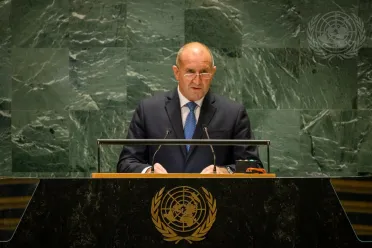Statement
Statement summary
RUMEN RADEV, President of Bulgaria, said that his country approaches this General Assembly with renewed determination to promote multilateral and workable solutions achieved through negotiation, based on the Charter of the United Nations. Bulgaria’s commitment to multilateralism can be seen in its recent presidency on the Economic and Social Council and as a current member of the Human Rights Council. Recalling the importance of the SDGs adopted 17 years ago, he underscored their stark importance today and warned that the “sheer deterioration of the international peace and security environment in the last years is threatening the fulfilment of our sustainable development agenda — undermining the rules-based international order”.
Noting it has been two years since the Russian Federation’s full-scale invasion of Ukraine, which Bulgaria condemned from the start, he said: “Every single day of this war increases the risk of escalation in intensity and geographical scope, posing a substantial threat to global peace and security.” Further, the negative effects of the war on the economy and social systems are global, and the international community must facilitate de-escalation and dialogue. Meanwhile the conflict between Israel and Hamas following the latter’s brutal attack is creating a larger crisis, with “tens of thousands of dead and injured civilians in Gaza” and the near-total destruction of infrastructure. “We call for immediate ceasefire, free access of the humanitarian convoys as well as release of all hostages held by Hamas,” he said, voicing deep concern about recent developments in Lebanon, which risk regional escalation. “The spiral of violence and the human suffering must come to an end,” he continued, noting that a sustainable and lasting peace is only possible through the two-State solution. Evoking the possibility of a nuclear threat against the backdrop of increased global destabilization, he said that Bulgaria remains dedicated to the full implementation of the Non-Proliferation Treaty.
His country’s contribution to the SDGs include its National Development Program Bulgaria 2030, a raft of sustainable projects addressing education, healthcare and renewable energy. However, “worrying dynamics” in governance, democracy and human rights loom worldwide. “Bulgaria has never looked the other way,” he said, citing the country’s domestic policies and its work with the United Nations Children’s Fund (UNICEF) and the United Nations Entity for Gender Equality and the Empowerment of Women (UN-Women). An advocate for a human rights-based approach to sustainable development, his country welcomes the upcoming 2025 World Social Summit. Prioritizing regional stability is vital, he said, noting his country’s engagement with South-East European countries, he sounded the alarm over outbursts of hatred: “Fighting and curbing the aggressive nationalistic rhetoric all over the region and concentrating on a positive agenda of strengthening multi-ethnic societies and the rights of the constituent communities will prevent the evocation of the reminiscences of the troubled past of the region.”
While peace among nations deserves focus, it is “equally important to reconcile with nature”, he said, noting that climate change is a “threat multiplier”. Bulgaria urges concentrated focus on the global stocktake and more ambitious climate objectives. Finally, addressing UN reform, he voiced support for reforming the Security Council to enhance transparency and accountability. For its part, Bulgaria has cosponsored the General Assembly resolution on veto use. Moreover, he called for “an additional non-permanent seat for the Group of Eastern European States in a reformed [Security] Council”.
Full statement
Read the full statement, in PDF format.
Photo

Previous sessions
Access the statements from previous sessions.
